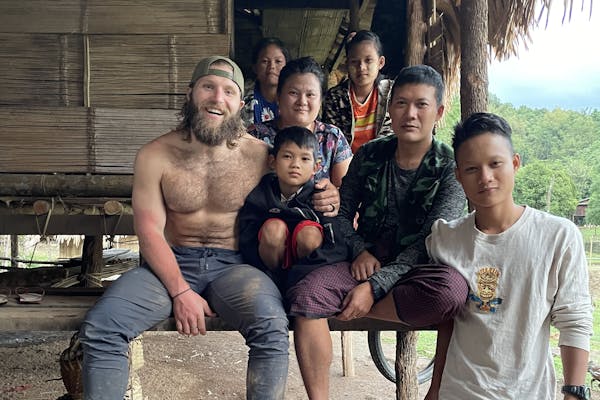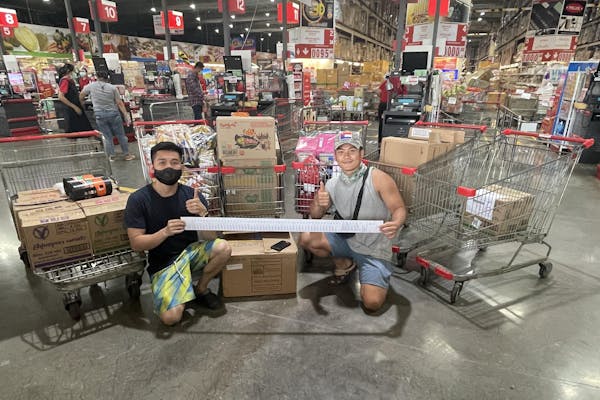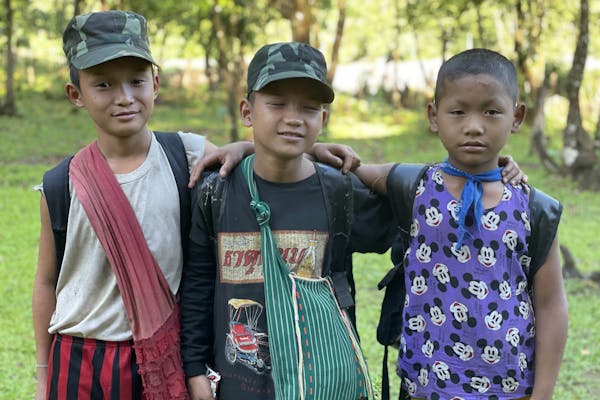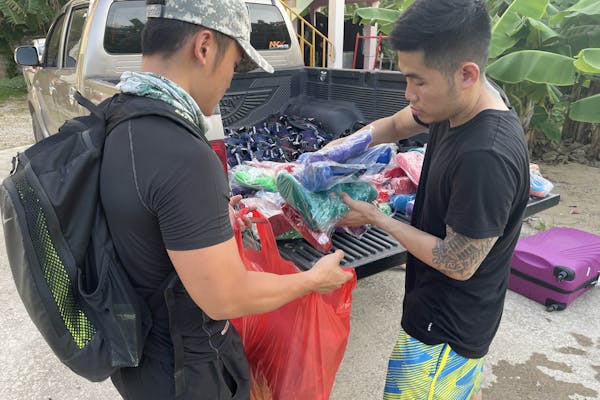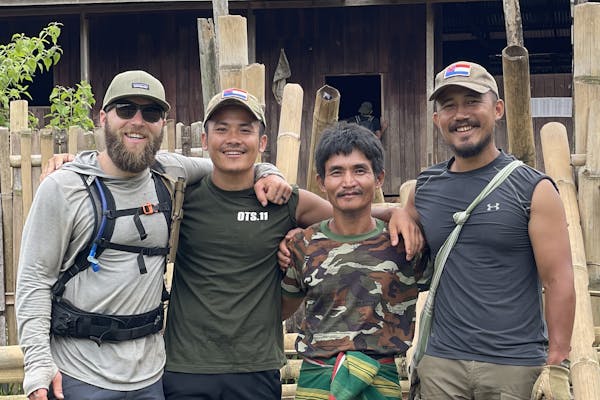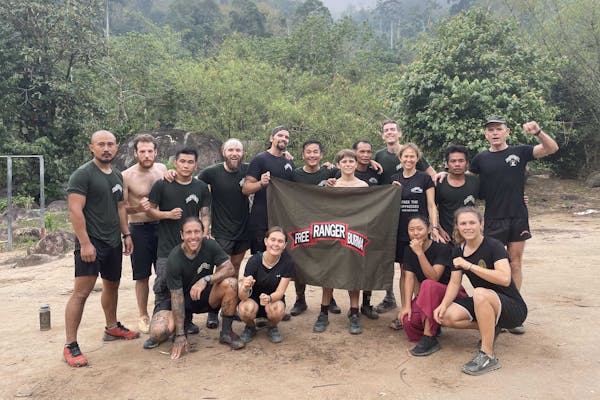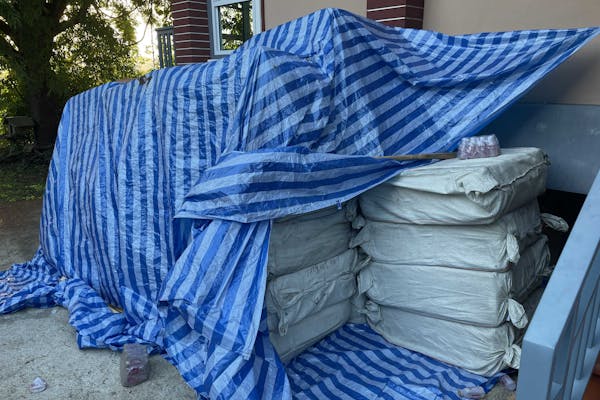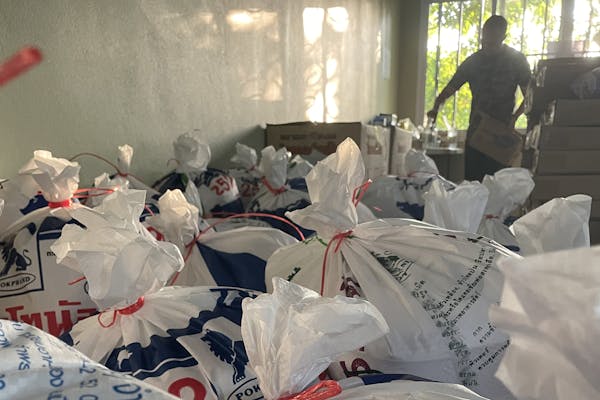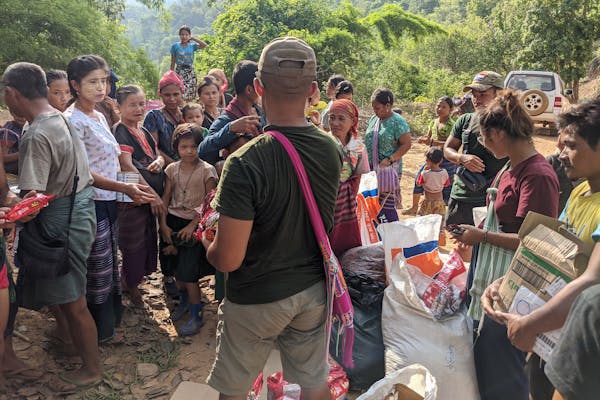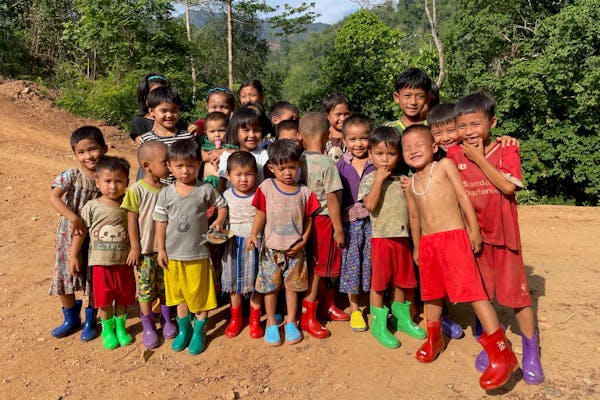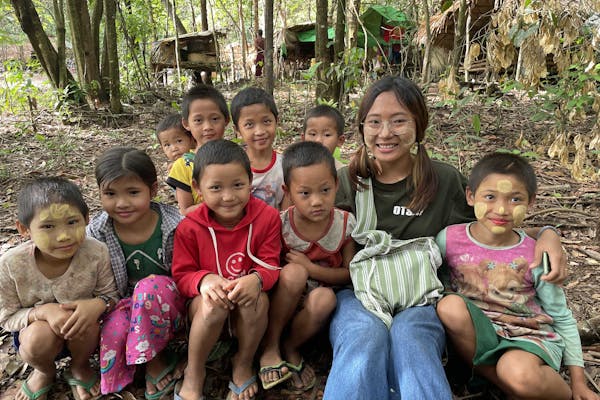A Humanitarian Crisis That Hits Close to Home
By Cherie Suonvieri '15, GS'21, content specialist
November 29, 2021 | 12:15 p.m.

In June 2021, Bethel alumnus Jesse Phenow ’14 (far right) traveled to Myanmar, along with a group from the Karen community, to deliver resources to those who’ve been forced to flee.
“If you are a student or Bethel alumni, you have an incredibly intimate connection to the crisis in Myanmar,” says Bethel alumnus Jesse Phenow ’14. “Not because of me—but because of the 16 Karen students who are part of the Bethel community.”
Of four-year universities across the country, Bethel is home to one of the largest populations of Karen students, says Jesse, a founding member of The Urban Village, which is a Karen community space in St. Paul, Minnesota. At over 20,000 people, the Twin Cities hosts the largest Karen community outside of Myanmar.
“The community is incredibly new,” says Jesse. “The first big wave of Karen refugees didn’t come until 2008. So a lot of these kids that have grown up here are now starting to go to college. A majority of the Karen students at Bethel have family and friends who are hiding from the violence in Myanmar right now. And honestly, most of them know what it’s like to have to run and hide for themselves.”
A brief introduction to the conflict
The Karen people are from eastern Myanmar, and they are one of several ethnic minority groups that have faced violence and oppression at the hand of a more than 70-year-long military regime. Under the rule of the Tatmadaw—Myanmar’s military—thousands of people have died and even more have been forced to flee to refugee camps in Thailand. In recent years, the military regime relinquished some of its power, allowing for a more democratic approach to government. But on February 1, 2021, after a major election, the Tatmadaw staged a coup and reclaimed its rule.
Inside Myanmar, hundreds of thousands of people took to the streets to protest. “For that first week in February, the protesters were out and there was this growing movement against the military regime,” Jesse says. “Initially, the military responded by avoiding confrontation with protesters. But after about a week, they switched their tactics. They just started killing people.” As a result of the conflict in Myanmar, over 1,300 civilians have been killed and over 10,000 have been arrested, according to the Assistance Association for Political Prisoners.
Many Karen people who still live in Myanmar have gone into hiding for their families’ safety. Jesse says that in the Karen ethnic area alone, there are 60,000 people who have fled into the jungle or to the mountain sides to seek refuge. Over time, those who’ve fled have also run low on basic supplies.
Responding to an escalating situation
In June 2021, Jesse went to Myanmar with a team from the Karen diaspora community to purchase and deliver around $100,000 worth of supplies to villagers in hiding. “It’s a really terrible situation, a big humanitarian crisis,” he says.
Loading Gallery...
Images From the June 2021 Trip to Myanmar
But it’s not just an isolated crisis that’s happening on the other side of the world. While the situation in Myanmar has rotated in and out of the news cycle, it’s a daily thought and a pressing reality for a number of Bethel community members.
For Jesse, it’s a pressing reality because he’s developed deep connections with the local Karen community. It began back in 2011 with volunteer hours for a Bethel course, where he spent time with a newly settled Karen family once a week. But that relationship grew far beyond the course requirements.
Jesse continued to spend time with the family, even after the course was over. He felt he needed a deeper understanding of the story of the Karen people, which he then made the topic of his senior thesis. After graduation, he spent six months in Thailand and Myanmar to learn more about Karen culture, which allowed him to connect with his Karen family in a new way. He’s traveled back to Thailand and Myanmar almost every year since.
When Jesse returned from his first trip, he became a mental health case worker in the local Karen and Karenni communities. In 2019, Jesse and two other Bethel alumni, Luke '14 and Tessa Buttenhoff '16, helped found The Urban Village. Today, he lives in East St. Paul in a home that he purchased with the Karen family he met back in 2011—and Luke and Tessa, who've developed a similar kinship with another Karen family, live just across the street.
“When you spend time like that, you begin to identify with people. They become yours, and you become theirs,” Jesse says. “When it comes to somebody else or an ‘other’—someone that you’re not connected to or that you don’t identify with—it’s pretty easy to think of their issues and their realities as their own. But when you begin to identify with people, when you commune with people, when you become kin with those people—you never stop fighting for your own.”
For Bethel’s Karen students, the crisis is a pressing reality because they have family members back in Myanmar. And they also remember what it was like to leave home, seeking a better life. Meet three of Bethel’s Karen students, Tu Lor Eh Paw ’22, Mu Ku Shi ’23, and Htoo Ku Paw ’24.

Meet Tu Lor Eh Paw '22
Tu Lor Eh Paw, the youngest of nine, was born in a small village in Burma, now Myanmar, where her family was one of only ten families in the community. Three of her siblings died before age 18, and her mother died when she was 2. At age 5, Tu Lor’s father moved her siblings to Thailand to give them an opportunity for education, and Tu Lor stayed home to care for her grandmother, who was blind. In 2009, in the midst of political unrest, Tu Lor joined her siblings at the refugee camp in Thailand. Then in 2011, Tu Lor’s father took her and three of her siblings to the United States.
Tu Lor turned 11 years old the day they arrived. She attended elementary, middle, and high school in St. Paul, and would eventually enroll at Bethel in 2018 to study business with an emphasis in marketing. When Paw first arrived at Bethel, she remembers there being only four or maybe five other Karen students. “Now that I’m graduating, the number of Karen students and students of color has increased drastically,” she says. “That’s been really helpful for me when it comes to finding comfort during this time.”
After hearing about the coup on February 1, Tu Lor remembers feeling a little hopeless. One of her brothers and his family, her sister and her family, and all of Paw’s aunts and uncles are still in Myanmar. Over the past year, they’ve run low on some of their main sources of food, like rice, and even if they had the money to purchase supplies, most of the trading posts and transportation options have been shut down. “I didn’t know how to help. We have the money here, but even if we send money, they don’t have bank accounts like we do,” Tu Lor says. “So I felt hopeless. But I’ve been remaining hopeful that they will find some source of help.”
The village where a majority of Tu Lor’s family is located is small and deep in the mountains, so humanitarian services don’t often reach them—but because of the remote location, typically they are safer from military attacks. However, Tu Lor’s brother’s family, along with one of her uncles, were located near a city that was subject to airstrikes earlier this year, so they’ve since had to relocate.
Tu Lor is able to keep in touch with her family in Myanmar, but communication is sporadic because her family doesn’t have cell service available and needs to travel to a phone station to make calls. In this season of uncertainty, she’s found comfort among friends, family, and community. “Like with Jesse’s team that’s gone into Myanmar, I’ve found it helpful in knowing that there are people willing to sacrifice their own comfort in order to get people in Myanmar the peace and help that they want and need,” she says.
Tu Lor adds that she’s also learned a lot from and felt supported by her dad: “He lived through the last coup, and ever since he was born, he’s had to live through the Burmese military brutalizing our people. I’ve learned a lot about our people’s history and also about my own family’s history of running.”
When asked what others in the Bethel community can do to support their Karen students and classmates, Tu Lor encouraged people to step out of their comfort zones and suggested that it starts with being interested in what’s going on around the world. “Being at Bethel, we’re in a bubble. But we have to be willing to look outside of America to understand what’s going on around us and understand the privilege that we’re living in,” she says. “We also need to be willing to seek out multiple perspectives, especially the perspectives of the people who have been oppressed for so long.”
After graduation, Tu Lor hopes to put her skills and passions to work at an organization that serves immigrants and refugees, specifically the Karen people, if possible.

Meet Mu Ku Shi '23
Mu Ku Shi spent the first ten years of his life in a refugee camp located in a Thai rainforest. Before he was born, his family lived in a small village in Myanmar. Several times, his family fled from their village into the forest because the military came to raid the Karen community and burn their homes. Eventually, Mu’s mother made the decision to move the family to the refugee camp.
Mu is the fifth born of nine children. Though it was over ten years ago now, he vividly remembers both the camp and his journey to the United States. He’d never before been to a large city or traveled by plane or car. “Even seeing people of different races was a new experience,” he says. “Growing up where I did, I thought Karen people were the only people on earth.” Mu, age 10, was happy to be experiencing a new place, but he remembers the transition being hard on his parents and older siblings.
“They had to leave everything behind and move to a place that was so foreign to them,” Mu explains. “It was hard for them to leave family behind. We started with nothing in our pockets, and we also had to learn a new language.”
Upon arriving in the United States, Mu’s family spent four months in Texas before they settled in St. Paul. Mu graduated from Como Park High School in 2019, and then came to Bethel to study business and play soccer.
Mu’s aunt and grandparents still live in Myanmar, and several months ago they contacted Mu’s family in St. Paul and let them know that they’d had to flee. “The phone signal wasn’t that good, but they let us know that they had to leave their hometown and move to somewhere in the rainforest,” Mu says. “They tried to get across the border between Thailand and Myanmar, but the Thai military wouldn’t let them through.”
Knowing about the challenges his family is facing back in Myanmar has been a lot to take in, Mu says: “I’m still adapting to American culture—figuring out how to be American and how the economy works here. I’m trying to adapt to something, but then my past is also still trying to reach me. I don’t know where to go. I’m kind of in between.”
Mu’s hope is that he’ll be able to draw the community’s awareness toward what’s happening in Myanmar and the ways it affects the Karen people. He also hopes to raise more awareness around who the Karen people group is, in general, which he says he’s been able to do through being involved in soccer.
Mu is glad to see a growing Karen community at Bethel. “It shows that Karen people can do big things,” he says. “Even though our home country is at war, we can do bigger things here, so we can support the people there.”

Meet Htoo Ku Paw '24
Htoo Ku Paw was born in a refugee camp in Thailand. Ever since she was young, she’s heard stories from her parents who’d fled to the camp from a village in Myanmar under the threat of violence. The camp was small, relatively speaking; it had limited educational resources and food supplies. But she does have some fond memories of growing up in the camp, like playing games, swimming in the river, and eating mangos with other kids.
Eventually, Htoo’s parents decided to make the journey to the United States to increase their children’s odds at receiving a quality education. Their first stop was another refugee camp in the Karenni states, where Htoo learned more about the culture of the Karenni people—another ethnic minority group that has faced persecution in Myanmar. In 2010, Htoo’s family was able to settle in Texas, where they stayed for seven years, until they moved to St. Paul in 2017 to join a larger Karen community and seek out better educational opportunities.
Htoo attended high school in St. Paul, and then came to Bethel, after winning an Act Six scholarship, to study elementary education with an emphasis in middle school social studies. Htoo is passionate about education for a variety of reasons—but one of the main reasons is that her parents didn’t have much opportunity to go to school. Her dad received, at most, a second grade education, and her mom even less, which is a common experience for Karen people who grew up in Myanmar in the midst of unrest. She views education as an opportunity to give back to her community in St. Paul, and she looks forward to joining a small but growing number of Karen educators in the Twin Cities.
Htoo chose to attend Bethel for a variety of reasons: it was close to home; there was a preexisting community of Karen students; it’s a Christian school, where she could grow in her faith; and it felt like a truly safe place. “I was so glad to be able to choose Bethel,” Htoo says. “Having that Karen community meant so much, and we are able to be support systems to one another. With what’s happening in Myanmar, we can let each other know that we feel the pain as a community.”

Htoo Ku Paw, Tu Lor Eh Paw, and Mu Ku Shi
The coup that began in Myanmar on February 1 brought to life all of the stories that Htoo had heard from her parents over the years. “It really hit me, then. Before the coup, we had these stories that were verbally given to us—these stories about having to run away,” Htoo says. “But after the coup happened, I started to see these images of what was happening on social media. That made me view the stories from my parents in a new way.”
Htoo started asking her parents more about their experience fleeing violence, and she started sharing her family’s story with friends. “I never knew my story was that important. What happened back then, influenced who I am right now,” she says. “I started advocating for my community and speaking out about what’s happening in Myanmar. I need to care about this because it’s my country. If I don’t care about this, then nobody is going to care.”
For people who are interested in supporting the Karen people in the midst of the unrest in Myanmar, Htoo says the first step is to increase one’s awareness of what’s happening. “It helps to know where people are coming from—to be able to give space for the Karen community to process and be heard. Get to know the Karen people around you. Ask questions and hear their voices,” Htoo says. “And finding ways to offer financial support to those still in Myanmar is really helpful, too.”
A return to Myanmar
Jesse and a team from The Urban Village will soon be returning to Myanmar to bring more food and supplies to people in hiding and to provide support to local schools that have had to shut down and consolidate in areas experiencing high levels of violence. The group is accepting donations on the Urban Village website to support the cause.
“The Karen students at Bethel grew up running away from what is happening right now. My hope is that Bethel recognizes and engages with what is happening in a smaller part of their community,” Jesse says. "The Karen community is our community. And as Christians, we belong in the trenches with those who are suffering, no matter how dangerous or challenging it may be.”
Scholarship For Emerging Urban Leaders
Bethel University partners with the Act Six program to provide full-tuition, full-need scholarships to emerging urban leaders who want to make a difference on their campus and in their community.
